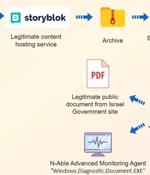Security News

Phishing campaigns delivering malware families such as DarkGate and PikaBot are following the same tactics previously used in attacks leveraging the now-defunct QakBot trojan. “These include...

The official Twitter account for Bloomberg Crypto was used earlier today to redirect users to a deceptive website that stole Discord credentials in a phishing attack. As first spotted by crypto fraud investigator ZachXBT, the profile contained a link to a Telegram channel with 14,000 members, further pushing visitors to join a fake Bloomberg Discord server with 33,968 members.

The official Twitter account for Bloomberg Crypto was compromised earlier today, ultimately redirecting users to a deceptive website used to steal Discord credentials in a phishing attack. As first spotted by crypto fraud investigator ZachXBT, the hijacked profile contained a link to a fake Telegram channel with 14,000 members, further pushing visitors to join a fake Bloomberg Discord server with 33,968 members.

Malaysian law enforcement authorities have announced the takedown of a phishing-as-a-service operation called BulletProofLink. The Royal Malaysian Police said the effort, which was carried out with assistance from the Australian Federal Police and the U.S. Federal Bureau of Investigation on November 6, 2023, was based on information that the threat actors behind the platform were based out of the country.

The notorious BulletProftLink phishing-as-a-service platform that provided more than 300 phishing templates has been seized, the Royal Malaysian Police announced. PhaaS platforms provide cybercriminals with tools and resources to carry out phishing attacks through "Ready-to-use" kits and templates, page hosting, customization options, credential harvesting, and reverse proxying tools.

The Iranian nation-state actor known as MuddyWater has been linked to a new spear-phishing campaign targeting two Israeli entities to ultimately deploy a legitimate remote administration tool from...

Humans are still better at crafting phishing emails compared to AI, but not by far and likely not for long, according to research conducted by IBM X-Force Red. Creating phishing emails: Humans vs. AI. The researchers wanted to see whether ChatGPT is as capable of writing a "Good" phishing email as attackers are.

Hacker Stephanie "Snow" Carruthers and her team found phishing emails written by security researchers saw a 3% better click rate than phishing emails written by ChatGPT. An IBM X-Force research project led by Chief People Hacker Stephanie "Snow" Carruthers showed that phishing emails written by humans have a 3% better click rate than phishing emails written by ChatGPT. The research project was performed at one global healthcare company based in Canada. In order to get ChatGPT to write an email that lured someone into clicking a malicious link, the IBM researchers had to prompt the LLM. They asked ChatGPT to draft a persuasive email taking into account the top areas of concern for employees in their industry, which in this case was healthcare.

Taiwanese networking equipment manufacturer D-Link has confirmed a data breach that led to the exposure of what it said is "low-sensitivity and semi-public information." "The data was confirmed...

Taiwanese networking equipment manufacturer D-Link confirmed a data breach linked to information stolen from its network and put up for sale on BreachForums earlier this month. The attacker claims to have stolen source code for D-Link's D-View network management software, along with millions of entries containing personal information of customers and employees, including details on the company's CEO. The stolen data allegedly includes names, emails, addresses, phone numbers, account registration dates, and the users' last sign-in dates.